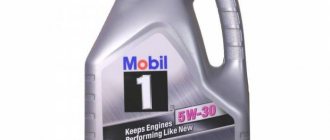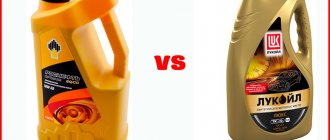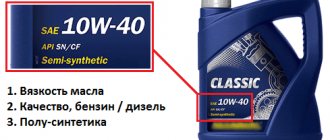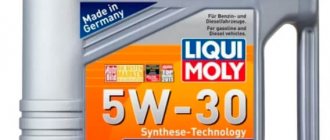Extreme operating conditions of diesel oil
During operation, diesel oil takes on many functions aimed at ensuring normal engine operation and extending its service life. The main functions include:
- lubrication of all main elements;
- removal of excess heat from diesel elements;
- protection of the motor from corrosion;
- removal of wear/carbon deposits from the power unit.
The above functions are taken over by the new oil. Over time, it wears out due to extreme operating conditions. Unlike lubricant for gasoline engines, the diesel version carries increased loads, which is due to the following factors:
- Increased combustion temperature. Over time, this leads to coking/burning of the lubricant, deterioration of viscosity characteristics, contamination of oil channels and breakdowns.
- Working on low-grade fuel. This is due to the peculiarity of diesel internal combustion engines, in which the fuel mixture is supplied in a “purer” form and ignites under the action of compression force.
- Accelerated process of mixture formation and combustion in the engine.
- A large amount of soot that appears during operation. This is due to the difficulty of completely burning diesel fuel in the engine. At the same time, exhaust gases saturate the oil with sulfur. As a result, diesel oil ages faster, oxidizes and loses its original characteristics.
Important
The life of the internal combustion engine depends on the quality and composition of the lubricant for a diesel engine.
The purpose of the oil is to maintain stable operation and performance characteristics throughout the entire period of operation. That is why it is recommended to change the lubricant for diesel engines more often - after 5-7 thousand kilometers, depending on operating conditions.
Russian motor oils for diesel engines
To talk about the properties of oils for diesel engines, it is necessary to have at least a general idea of the design and features of diesel engines.
First of all, they are economical - a high compression ratio makes it possible to increase the efficiency of diesel engines compared to gasoline engines by an average of 40%. Consequently, diesel fuel consumption is 30-40% less. Diesel engines have a much more complex design than gasoline engines, and with proper care they provide a longer service life.
However, at the same time, diesel engines are fragile and very sensitive to fuel contamination by mechanical particles and water. Such contaminants very quickly damage the fuel system.
Diesels differ in many methods of mixture formation, operating conditions and a fairly wide selection of unit capacities (from several to tens of thousands of kilowatts). Thus, the range of diesel oils varies significantly in terms of the requirements put forward to them and their performance properties.
The main criteria determining the choice of lubricant:
- Type and purpose of diesel engine
- Engine boost level
- Severity of working conditions
- Type and quality of fuel used
Typically, engine operating instructions contain information about approved brands of oils, methods of servicing diesel lubrication systems, including the replacement period or maximum service life of oils.
All diesel oils contain additives that are added to distillate, compounded or selectively refined residual base oils made from sweet or sour crude oils.
The range of levels of performance properties of diesel oils covers all groups according to the GOST 17479.1-85 classification.
Oils of groups A and B2 are designed for older model diesel engines running on fuel with low sulfur content. The demand for oils of these groups remains, mainly due to tradition and low prices. With rare exceptions, oils of groups A and B2 can be replaced by more effective oils of group B2 of the same viscosity class.
MS-20P oil (TU 38.101265-88) is obtained by adding a multifunctional additive to MS-20 oil.
It is used for lubrication of marine, diesel locomotive and stationary diesel engines of type 12CHN 18/20, operating on low-sulfur fuel.
Oil M-16PTs (GOST 6360-83) is produced from sulfurous oil. It contains multifunctional and depressant additives.
Used for lubricating engines of types V-2, D-6 when operating on low-sulfur fuel.
Oil M-14B (TU 38.101264-72) is produced from low-sulfur and sulfur oil by compounding distillate and residual components with the multifunctional additive VNIINP-360 and anti-foam additive PMS-200A.
They are used in two- and four-stroke diesel locomotive diesel engines of types 2D100, D-50 and shunting and industrial diesel locomotives similar to them in terms of boost level.
MTZ-10P oil (GOST 25770-83) is produced on the basis of a low-viscosity distillate component with a standardized fractional composition by thickening with a polymer viscosity additive and adding a composition of additives.
They are used primarily for winter operation of transport diesel engines with a low degree of boost.
MT-16P oil (GOST 6360-83) is produced from low-sulfur oil by compounding a mixture of residual and distillate components with a composition of detergent, antioxidant, depressant and anti-foam additives. With the use of a new, more effective additive composition, the level of performance properties of MT-16P oil exceeds the requirements for group B2 oils.
It is used for lubricating transport diesel engines of type V-2 and naturally aspirated engines with similar boost levels.
Group B2 oils are produced from low-sulfur and sour crude oils. They contain additive compositions that give the oils performance properties that ensure reliable lubrication of naturally aspirated automotive diesel engines of older models, as well as marine, diesel locomotive, stationary and medium-level transport diesel engines when operating on distillate diesel fuel with a sulfur content of up to 0.5% (wt. fraction). ).
Oils M-8B2 (TU 38.401-58-37-92) and M-10B2 (GOST 8581-78) are made from mixtures of distillate and residual components produced from sour crude oil.
Used for lubrication of automobile and tractor diesel engines SMD-14, A-41, D-50, D-37M and others in winter (M-8B2) and summer (M-10B2).
M-10V2S oil (GOST 12337-84) is produced mainly from low-sulfur oil by compounding distillate and residual components with a composition of additives.
Used for lubrication of main and auxiliary diesel engines of sea and river vessels, diesel generators, as well as in the circulation systems of two-stroke crosshead marine diesel engines. Can be used in automobile and tractor diesel engines along with summer oil M-10B2.
Oil M-14B2 (GOST 12337-84) is produced by mixing distillate and residual components produced from sour or low-sulfur oil with a composition of additives.
Used for lubrication of two- and four-stroke diesel locomotive and trunk-type marine diesel engines when operating on distillate diesel fuels with a sulfur content of up to 0.5% (wt. fraction), as well as engines of mining dump trucks.
Oil M-20V2F (GOST 12337-84) consists of residual base oil obtained from sour crude oil and a special composition of additives without zinc dithiophosphates.
Used for lubrication of marine diesel engines of types 12ChN 18/20 and ChN 16/17, which have an increased degree of boost or are operated with extended oil change periods.
Oils M-14V2z and M-20V2 (GOST 23497-79) are produced using medium-viscosity compounded and residual components, respectively. To these base oils obtained from sour crude oil, additive compositions have been added, selected taking into account the conditions of use of oils for lubricating diesel engines of drilling rigs in winter and summer.
Oil M-14V2z (winter) is thickened with a viscosity additive, but is not all-season.
Oil M-16B2 (TU 38.101235-74) consists of a mixture of residual and distillate components obtained from low-sulfur oil, and a composition of additives.
Designed for lubrication of main engines of river vessels.
Oil M-16IHP-Z (GOST 25770-83) is produced from a mixture of residual and distillate components produced from sour crude oil. Contains a specific composition of additives.
Used for lubricating high-performance transport diesel engines, including supercharged engines.
G2 oils are produced from sulfur and low-sulfur oils. All oils in this group contain significantly more effective additives than oils in group B2.
The high degree of alloying of G2 group oils allows them to be used in more severe conditions, where high thermal stability, better antioxidant, detergent-dispersant, neutralizing and anti-wear properties are required.
High-speed diesel engines lubricated with G2 oils operate on distillate fuel with a sulfur content of up to 0.5% (mass fraction), and medium- and low-speed marine diesel engines with a large cylinder diameter - up to 1.5% (mass fraction).
Oils M-8G2 and M-10G2 (GOST 8581-78) are produced by mixing distillate and residual components produced from sour crude oil with a composition of additives.
Used respectively for winter and summer operation of automobile and tractor diesel engines without supercharging or with low supercharging. M-10G2 oil is also used for lubrication of high-speed stationary diesel engines and diesel generators.
Oils M-8G2k and M-10G2k (GOST 8581-78) differ from oils M-8G2 and M-10G2 only in significantly more effective additive compositions, which makes it possible to increase oil change intervals.
Oils M-8G2k and M-10G2k are successfully used in modern KamAZ and ZIL vehicles, as well as Ikarus buses.
Oil M-14G2k (TU 38.401-58-98-94) has the same composition as G2k oils (GOST 8581-78).
Designed for four-stroke transport diesel engines. Can be used instead of M-10G2k oil for summer operation of automotive diesel engines in regions with long and hot summers.
Oils M-8G2U and M-10G2U (TU 38.401-58-21-91) are produced by mixing distillate and residual components produced from sour crude oil with an additive composition characterized by significantly increased and prolonged antioxidant and detergent-dispersant properties.
Designed for automotive and stationary diesel engines that use M-8G2k and M-10G2k oils.
Switching to G2u brand oils makes it possible to increase the replacement period for oil and fine filter elements by 2 times, reduce oil consumption and maintenance costs for diesel engines, and halve the volume of used oils, which is important for the ecology of those areas where there are no conditions for their disposal. In KamAZ car engines, an oil change is necessary after a mileage of 25-30 thousand km.
Oils M-10G2TSS, M-14G2TSS and M-16G2TSS (GOST 12337-84) consist of mixtures of distillate and residual components produced from sulfur or low-sulfur oil and a composition of effective additives.
Designed for lubrication of main and auxiliary trunk diesel engines of marine transport, fishing and river fleets.
M-10G2TSS oil is also used in the circulation systems of crosshead diesel engines with a high degree of boost, and M-16G2TSS oil is used for lubricating the cylinders of trunk and crosshead diesel engines using lubricators, when the mass fraction of sulfur in the fuel used is no more than 1.5%.
M-14G2TSS oil is widely used in diesel locomotive diesel engines of the ChN 26/26 type, stationary diesel generators with engines of the ChN 40/48 type, diesel gear units with engines of the ChN 40/46 type.
G2TSS brand oils have received approval for use by foreign diesel manufacturers.
Oils M-10G2TSS, M-14G2TSS and M-16G2TSS can be used to lubricate a number of ship mechanisms and units that require oils of appropriate viscosities (gearboxes, compressors, blowers, etc.).
A distinctive feature of these oils is very good moisture resistance, low emulsification with water and easy separation of water during separation.
Oil M-14G2 (GOST 12337-84) consists of a mixture of distillate and residual components produced from sulfur oils, and a composition of additives with particularly high detergent properties.
Designed for lubrication of diesel locomotive diesel engines of type ChN 26/26 when operating on fuel with a mass fraction of sulfur up to 0.5%.
Oil M-20G2 (GOST 12337-84) consists of residual base oil and an additive composition that ensures reliable lubrication of two-stroke diesel engines under specific conditions.
Designed for operation of marine and stationary diesel engines of type DN 23/2×30.
Oils of group D2 are produced on the basis of base components obtained from sour crude oil, or using synthetic components. In the compositions of group D2 oils, effective additives are used in high concentrations.
This makes it possible to achieve a level of performance properties that ensures long-term performance of the most advanced engines under particularly difficult operating conditions, in particular when using fuel with a high sulfur content.
Oils M-8DM and M-10DM (GOST 8581-78) consist of mixtures of distillate and residual components produced from sulfur oil and a new composition of additives that improves the anti-corrosion and anti-wear properties of DM oils.
Designed respectively for winter and summer operation of highly accelerated turbocharged diesel engines operating in difficult conditions. Can be used in naturally aspirated diesel engines with significantly increased mileage between oil changes.
Provide reliable lubrication of domestic and imported equipment (heavy-duty mining dump trucks, high-power industrial tractors with water or air-cooled engines, excavators, bulldozers, forklifts, pipelayers).
Oil M-14DM (TU 38.401-58-22-91) differs from oil M-10DM in the higher viscosity of the base oil, but has the same purpose.
It is preferably used in areas with hot, long summers, as well as in engines that require oil of viscosity class 14 (SAE 40) for lubrication.
Oil M-6Z/14DM (TU 38.401-938-92) consists of a low-viscosity base oil produced from sulfur crude oil and thickened with a viscosity additive, and a composition of additives.
This all-season oil can be used all year round in supercharged diesel engines operating under severe conditions, instead of two seasonal oils M-8DM and M-10DM.
MT-5Z/10D oil (TU 38.401-58-40-92) is prepared by thickening a low-viscosity base oil from sulfur oils with a polymer viscosity additive and adding an additive composition that gives the finished product the properties of high-performance diesel oil, gear oil of the TM-4 group (GL- 4 according to API) and hydraulic fluid for hydraulic systems of industrial tractors and agricultural machines.
It is used all-season in regions with moderate climatic conditions as a single motor-transmission-hydraulic oil that provides reliable lubrication of supercharged diesel engines, including air-cooled engines, tractor transmission units and hydraulic systems that control the working parts of machines.
MT-5Z/10D oil is similar to imported oils called STOU (Super Tractor Oil Universal).
Oil MT-4Z/8DS (TU 38.401-58-54-92) is prepared on the basis of synthetic base components and a special composition of additives.
Used as an all-season single oil for engines, transmission units and hydraulic systems of industrial tractors in the climatic conditions of the North. Used in all equipment lubricated with MT-5Z/10D oil under moderate climatic conditions.
Oil M-14DR (TU 38.401-1063-97) consists of a mixture of distillate and residual components produced from sulfur oil, and a composition of additives that give the oil increased resistance to aging.
Designed for lubrication of diesel locomotive diesel engines of type ChN 26/26 when operating on fuel with a sulfur content of up to 0.5%. Provides a significant increase in mileage without changing the oil and an increase in the service life of fine filter elements compared to M-14G2 and M-14G2TSS oils. Similar to imported fourth generation oils.
Oil M-16DR (GOST 12337-84) differs from oil M-14DR only in a slightly higher base viscosity.
It is intended for lubrication of marine two- and four-stroke trunk-type diesel engines DN 23/30, ChN 26/26 and ChN 30/38 when operating on fuel with a mass fraction of sulfur up to 0.5%. Has increased resistance to aging.
Oils M-10ДЦЛ20, М-14ДЦЛ20 and М-14ДЦЛ30 (GOST 12337-84) consist of mixtures of distillate and residual components produced from sour crude oil, and additive compositions in various dosages to obtain finished oil with alkaline numbers of about 20 or 30 mg KOH /G.
Designed for lubrication of medium-speed trunk marine diesel engines with a circulation or combined lubrication system. Oils M-10DTsL20 and M-14DTSL20 are used when working on heavy fuel with a mass fraction of sulfur up to 2.5-3.0%, oil M-14DTSL30 - with a higher sulfur content.
They have good moisture resistance and low emulsification with water, and easily separate water during separation. Approved for use by foreign diesel manufacturers.
How to recognize diesel oil
Many car owners do not know the specifics of the designation, which is why they accidentally buy lubricant for gasoline engines. Externally, the oil container for diesel engines is no different. A wide range of products are available on the market, differing in class, standard and type. Moreover, all oils differ in viscosity, seasonality and other factors.
When choosing a diesel product, pay attention to the following points:
- Type. Mineral, semi-synthetic and fully synthetic options are available for sale. The latter are distinguished by improved properties at lower temperatures, easier engine starting and a better composition of additives.
- Supplements Modern oils for diesel engines include detergents, corrosion protection, extreme pressure and other types of additives that provide an improved viscosity index and reduce the pour point.
- Seasonality, viscosity index. We will dwell on these questions below.
The main feature is the markings on the packaging. In simple words, diesel oils according to the API standard are designated CF-4, CG-4 or CH-4, which is relevant for 4-stroke engines. For the ACEA classification, such products are designated by the letter “B” for passenger cars, “E” for diesel trucks and “C” for cars with particulate filters. But we will dwell on these issues in more detail in the section below.
In addition, diesel engine oil has a number of special characteristics:
- Increased base number. This is very important when operating an engine with worn CPGs and when using low-quality diesel fuel.
- Improved quality of additives. Diesel oil must retain soot and remove excess components from the engine, leaving them on the filter element.
- Thermal stability. Despite the overall lower operating temperature, at some points this figure is higher than that of gasoline engines. This is especially true for high-power turbocharged diesel engines.
- Improved wear protection. A feature of the diesel internal combustion engine is the increased load on the crankshaft even at low speeds, when the pressure drops to a minimum parameter.
High-quality formulations for diesel internal combustion engines are equipped with a rich composition of additives, and the products themselves must comply with all standards in terms of environmental requirements.
What kind of oil should I put in my engine for the winter?
Nowadays there is a huge number and variety of brands of oils for cars on the market.
SAE standard
The ease of pumping and lubrication of parts depends on the viscosity. On the canisters you can see markings such as: 10w-40, 5w-40, etc. “W” - indicates that the oil is intended for use at low temperatures.
The higher the number , the thicker it is. 5W is designed for temperatures down to -25 degrees, while 15w is designed for temperatures down to minus 15 degrees.
- SAE 20W-40 – from -10 to +45;
- SAE 15W-40 – from -15 to +45;
- SAE 10W-40 – from -20 to +35;
- SAE 10W-30 – from -20 to +30;
- SAE 5W-40 – from -25 to +35;
- SAE 5W-30 – from -25 to +20;
- SAE 0W-40 – from -30 to +35;
- SAE 0W-30 – from -30 to +20
Therefore, for Russia, located in temperate latitudes, an excellent choice of diesel oil in winter would be 5W-40. This can be used all year round. Therefore, when choosing, take into account regional characteristics and temperature changes.
API standard
An American standard that has highlighted its classification. He divides the liquid into 2 categories:
- S – for gasoline cars;
- C – for diesel cars.
Regarding diesel engines, the best option would be an oil belonging to the CF class . It is also excellent for diesel engines with turbines.
Energy saving motor oil
The purpose of such motor fluid is to save fuel. In addition, this oil increases the environmental friendliness of the engine. Reduced fuel consumption occurs due to reduced friction of parts.
Ordinary oil at high temperatures, about 150 degrees, is quite viscous, providing a reliable oil film. A decrease in viscosity under such conditions leads to a decrease in friction during operation, accordingly the load and a decrease in fuel consumption.
As the engine temperature increases, the thickness of the oil film decreases, the engine runs easier, but the protection of parts also becomes worse.
It is worth knowing that energy-saving oil should not be used in cars not recommended by the manufacturer. The motor must be structurally adapted to this. In addition, for old diesel cars, it’s definitely not worth it .
Useful tips when choosing oil in winter
As everyone knows, at subzero temperatures the engine is very picky about the quality and composition of the oil. The lower the viscosity, the better. It is in winter that many car engines are susceptible to oil starvation.
When starting up, the thick oil does not have time to pump through the engine, as a result of which it runs almost dry. As a result, there is a load not only on the engine, but on the battery. It is in winter that batteries quickly lose their capacity.
Diesel oil is often divided into winter, summer and all-season . Winter engine oil is thinner, which allows you to start the engine when cold without any problems. Summer one has a more viscous composition, providing the necessary lubrication of internal parts. All-season is more widely used as it is more versatile.
If you often use your car and drive more than 20 thousand km per year, you can use a seasonal replacement. Before winter, fill in winter oil, and in spring - summer oil.
What kind of oil should you pour into a diesel engine in winter if you have a new car? In this case, if it is under warranty, use what is sold at dealer service stations. If you want to choose it yourself, then choose what best meets the API and SAE standards.
It is also worth considering that pay attention to the kilometers traveled after changing the oil. Failure to change the oil on time can destroy the engine.
ACEA oil class
When choosing motor oil for diesel engines, you must take into account the ACEA designation. Unlike the classification discussed above, this is a European version. Full name: Association des Constucteurs Europeens d'Automobiles. When choosing this criterion, you need to know the following notations:
- A - gasoline internal combustion engines;
- B — “diesel” passenger cars;
- E - for diesel power units of trucks;
- C - universal, compatible with particulate filters and catalysts.
After the letter there are also numbers indicating the year in which this classification appeared. When considering ACEA, it is necessary to take into account the features of the designation.
For example, B1-B5 are suitable for diesel cars and trucks with a minimum load capacity. In turn, E1-E5 is the best option for diesel engines of heavy equipment. Here the figure shows the requirements for the product. The larger it is, the higher the quality.
Diesel engine oil brands
Popular global automakers directly recommend that consumers use certain brands of oil (often produced directly by them). For example:
- Hyundai/Kia recommends ZIC oil (XQ LS).
- Ford offers M2C 913 oil for Zetec engines.
- In Opel engines before 2000, ACEA allows A3/B3 oil. Motors after 2000 can run on oil with GM-LL-B-025 approval.
BMW recommends using Castrol oils that meet its approvals or motor oils under its own BMW Longlife brand. This is especially true for engines that are equipped with variable valve timing systems.
The Mercedes-Benz concern for diesel engines produced after 2004, equipped with a particulate filter, provides motor oil under its own brand with an index of 229.31 and 229.51. One of the highest tolerances for motor oil for diesel engines is the index from 504.00 to 507.00. In diesel trucks, it is recommended to use oil marked CF-4.
Below we provide practical information with a rating of popular oils for diesel engines. When compiling the rating, the opinions of experts conducting relevant studies were taken into account. In particular, the following indicators are important for oil:
- the presence of unique additives;
- low phosphorus content, which ensures safe interaction of the liquid with the exhaust gas neutralization system;
- good protection against corrosion processes;
- low hygroscopicity (oil does not absorb moisture from the atmosphere).
When choosing a particular brand, be sure to take into account the requirements of the automaker of your car.
| Brand | Description | Viscosity | API/ACEA |
| ZIC XQ 5000 10W-40 | One of the best and most popular diesel oils. Produced in South Korea. Can be used in turbine engines. Recommended for Mercedes-Benz, MAN, Volvo, Scania, Renault, MACK brands | 10W-40 | API CI-4; ACEA E6/E4. Has the following approvals: MB 228.5/228.51, MAN M 3477/3277 Reduced Ash, MTU Type 3, VOLVO VDS-3, SCANIA LDF-2, Cummins 20076/77/72/71, Renault VI RXD, Mack EO-M+ |
| LIQUI MOLY 5W-30 TopTech-4600 | Popular and relatively inexpensive oil from a well-known German manufacturer. | 5W-30 | ACEA C3; API SN/CF; MB-Freigabe 229.51; BMW Longlife 04; VW 502.00/505.00; Ford WSS-M2C 917 A; Dexos 2. |
| ADDINOL Diesel Longlife MD 1548 (SAE 15W-40) | Belongs to the class of oils intended for use with heavily loaded engines (Heavy Duty Engine Oil). Therefore, it can be used not only in cars, but also in trucks. | 15W-40 | CI-4, CF-4, CG-4, CH-4, CI-4 PLUS, SL; A3/B3, E3, E5, E7. Has approvals: MB 228.3, MB 229.1, Volvo VDS-3, Renault RLD-2, Global DHD-1, MACK EO-N, Allison C-4, VW 501 01, VW 505 00, ZF TE-ML 07C, Caterpillar ECF -2, Caterpillar ECF-1-a, Deutz DQC III-10, MAN 3275-1 |
| Mobil Delvac MX 15W-40 | This Belgian oil is used for cars and trucks in Europe. It is of high quality. | 15W-40 | API CI-4/CH-4/SL/SJ; ACEA E7; MB-Approval 228.3; Volvo VDS-3; MAN M3275-1; Renault Trucks RLD-2 and others |
| CHEVRON Delo 400 MGX 15W-40 | American oil for diesel engines of trucks and cars (Komatsu, Man, Chrysler, Volvo, Mitsubishi). Can be used in turbocharged engines. | 15W-40 | API: CI-4, CH-4, CG-4, CF-4; ACEA: E4, E7. Manufacturer approvals: MB 228.51, Deutz DQC III-05, Renault RLD-2, Renault VI RXD, Volvo VDS-3, MACK EO-M Plus, Volvo VDS-2. |
| Castrol Magnatec Professional 5w30 | A very popular oil. However, it has low kinetic viscosity. | 5W-30 | ACEA A5/B5; API CF/SN; ILSAC GF4; Meets Ford WSS-M2C913-C/WSS-M2C913-D. |
The average cost is indicated as of prices for the summer of 2021 for Moscow and the region
The price of diesel oil depends on four factors - the type of base (synthetic, semi-synthetic, mineral), the volume of the container in which the liquid is sold, characteristics according to SAE/API/ACEA and other standards, as well as the manufacturer’s brand itself. We recommend that you buy oil from the middle price range.
Viscosity index
When choosing which oil to pour into a diesel engine, it is important to pay attention to the viscosity index. This parameter indicates the degree of change in viscosity characteristics taking into account the temperature regime. To increase this parameter, manufacturers carry out additional cleaning using special additives.
When determining the viscosity index, the SAE classification and the numbers that appear after this designation in the form 0W, 5E, etc. are taken into account. The lower the number, the higher the viscosity index should be. This parameter is tied to another indicator, which we will discuss below - seasonality.
The viscosity parameter itself is indicated at different temperatures - 100 and 150 degrees Celsius. For example, for 0W and 60W it ranges from 3.8 to 21.9 sq. mm/s for 100 degrees Celsius. This indicator should be taken into account when choosing.
Seasonality of oil
The next parameter that you need to pay attention to when choosing is the possibility of application in a certain season. From this point of view, lubricant is divided into three categories:
- summer;
- universal (all-season);
- winter.
This parameter is regulated by SAE class. The following trend applies here:
- Winter options - from 0W to 25W.
- Summer - from 20 to 60.
- Universal (all-season) from 10W-30 and above.
In all cases, the SAE designation is installed in front. The presence of the letter “W” indicates the possibility of use in cold weather conditions. The viscosity mentioned above is also indicated here.
Tips for using oil in a diesel engine
When choosing oil for diesel engines with or without turbocharging, take into account the operating characteristics. It is known that the presence of a turbine increases the efficiency of the engine, but the loads also increase. In this case, the engine needs higher quality oil.
- You also need to take into account that the lubricating composition operates under conditions of high temperatures, accelerated oxidation and rapid contamination. For this reason, the product must be characterized by increased stability. It is also necessary to look at the base (synthetic, semi-synthetic or mineral water), as well as the SAE class.
- Synthetic oil retains its quality longer, has better viscosity and a longer service life without losing its original characteristics. The downside is that when heated, this composition has increased fluidity, which can lead to the loss of some of the oil. Semi-synthetics have a shorter service life, but in cold weather it is more difficult to start the engine. But when heated, there is less risk of leakage, and the price is lower.
- It is believed that oil for diesel engines needs to be filled less frequently. But that's not true. According to the requirements of European manufacturers, the frequency should be about 80-10 thousand kilometers. This is even less than in the case of gasoline internal combustion engines. But such recommendations are typical for good roads and high quality fuel. In our conditions, due to the presence of sulfur in diesel fuel, the replacement interval should be lower.
- If the recommendations for changing the oil are not followed, the latter loses its original qualities. The composition increases the volume of excess impurities that appear due to oxidation and production. Most of the pollutants remain on the filter, but some enter the engine and thereby reduce its service life. Over time, the quality of the lubricant deteriorates and is unable to perform its intended functions.
Characteristics of diesel oils
Motor oils differ significantly in characteristics, depending on the production method, additives and raw materials used. The most important parameter discussed in this article is the ability to work at low temperatures .
Choosing the best oil for a diesel engine is not easy, because... The market offers a large number of different oils that have their own unique properties.
The following types of oils are distinguished:
- Mineral;
- Synthetics;
- Semi-synthetic.
Mineral oil
The name speaks for itself, i.e. This oil is made from natural products.
Winters in Russia are cold and temperatures often drop below 10 degrees Celsius. And in such conditions, at such a temperature, mineral oil will simply freeze in the engine of your car. This kind of oil should definitely not be poured into a diesel engine in winter.
Synthetics
What kind of diesel oil should you pour in winter if you have a new car? The answer is simple - synthetics . Synthetic for diesel is the best choice.
Synthetics have high fluidity, which creates minimal resistance and reduces friction of parts. In addition, such a liquid is designed for different temperatures and does not lose its properties.
This oil is highly not recommended for use in old cars or in engines with impressive mileage.
Semi-synthetics
In terms of chemical composition, this oil has a large number of natural components , however, artificial additives are also present. This liquid has a high viscosity and is recommended for use in the following cases:
- Primarily in old cars;
- In engines with a long service life;
- In cars that are designed for harsh conditions of use;
- In low-powered diesel cars.
Because of these advantages, semi-synthetics are so popular in Russia and the CIS countries, where the majority of cars are older than 10-15 years. Therefore, such oil is often poured into diesel engines with high mileage.
Viscosity
Viscosity is an important and basic characteristic. When choosing which oil to pour into a diesel engine in winter, you need to look exactly at its viscosity. In particular, when the car is often operated at sub-zero temperatures .
The internal components of the motor rub against each other, and at tremendous speed. The presence of an oil film protects parts from rapid wear, reducing friction and heating. Thick oil has a high viscosity; it will create additional resistance to parts when moving, increasing the load on the engine. And a sufficiently liquid one will simply drain, increasing the friction of parts, wearing out the metal.
Thus, in winter, the oil in a diesel engine should be moderately liquid, guaranteeing a quick start of the engine, but also thick enough to provide the necessary lubrication of parts.
Viscosity index for different types of oils:
- 140-170 for synthetics;
- 130-150 for semi-synthetics;
- 110-135 for mineral.
The higher the index, the slower the oil becomes liquid. Those. Optimal lubrication of components is maintained.
The lower the index, the faster it becomes liquid. The film becomes thin and, accordingly, engine wear accelerates.








